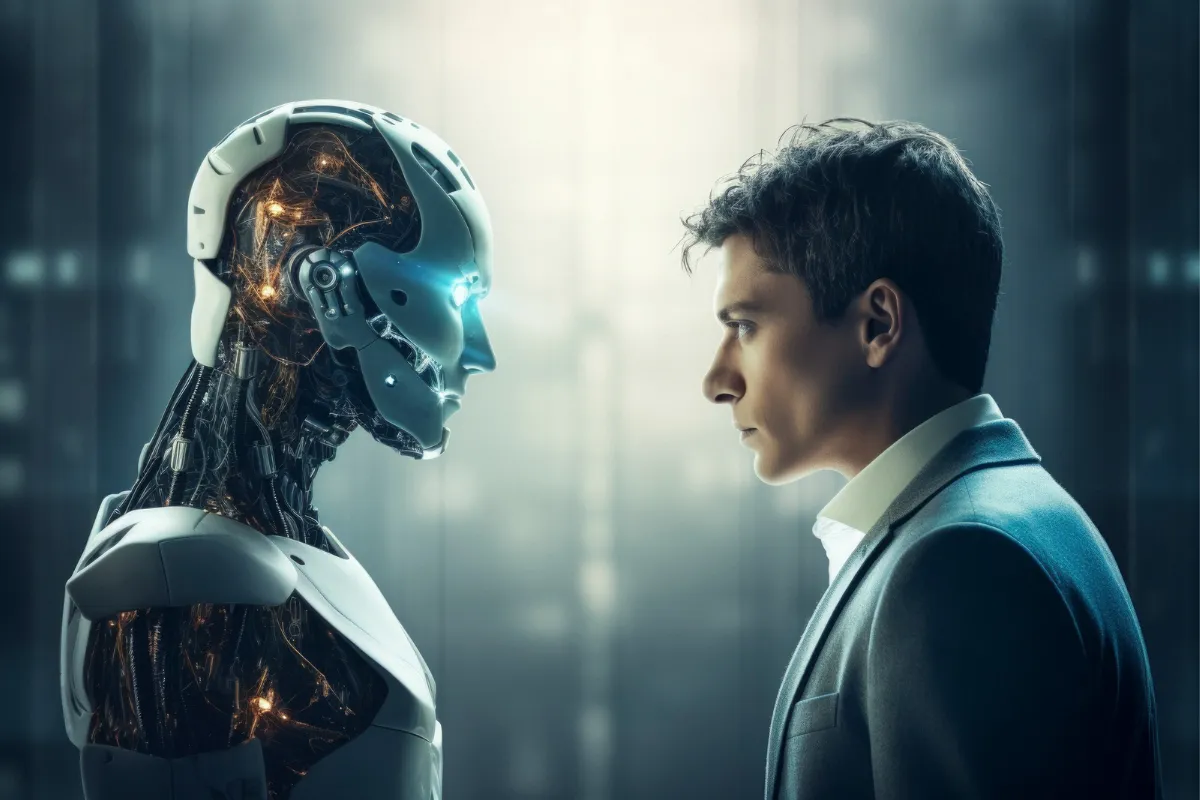Imagine a world where machines can learn, adapt, and even make decisions. This isn’t science fiction, it’s the reality of Artificial Intelligence (AI). AI has become a powerful tool, used in everything from smartphones to healthcare. But this rapid advancement also raises concerns, especially about its impact on jobs.
What is AI?
Think of AI as a computer program that can think and learn like a human, at least in some ways. It can:
- Analyse information: AI can process massive amounts of data, finding patterns and connections that humans might miss.
- Make decisions: Based on its analysis, AI can make decisions, sometimes even better than humans, especially for repetitive tasks.
- Adapt and learn: AI systems can continuously learn and improve as they are exposed to new data and experiences.
Imagine a program that can learn to play chess just by playing against itself, or a program that can translate languages by analyzing millions of examples of translated text. That’s the power of AI, and it’s still evolving.
Artificial Intelligence – Boon or Bane
Now, let’s address the big question: Is AI a blessing or a curse? Well, it’s a bit of both.
Boon: AI has the potential to revolutionise industries across the board. From healthcare to transportation, AI-powered systems can enhance efficiency, accuracy, and productivity. For instance, in healthcare, AI algorithms can analyse medical data to diagnose diseases more accurately and suggest personalised treatment plans. In transportation, self-driving cars powered by AI could reduce accidents and congestion, making roads safer for everyone.
Furthermore, AI can automate tedious and repetitive tasks, freeing up human workers to focus on more creative and high-value activities. This could lead to a surge in innovation and economic growth, creating new opportunities for job creation in AI-related fields.
Bane: However, the rapid advancement of AI also raises concerns about job displacement. As machines become more adept at performing tasks traditionally done by humans, certain jobs may become obsolete. For example, routine tasks in manufacturing, customer service, and data entry could be automated, leading to layoffs or job reassignments.
Moreover, AI’s ability to analyse vast amounts of data and make predictions could threaten jobs in sectors like finance, where routine decision-making is prevalent. This could exacerbate existing inequalities, as those with specialised skills or access to education and training in AI-related fields may thrive, while others face unemployment or underemployment.
Future of AI
Artificial intelligence (AI) is rapidly changing the world, and its impact is only predicted to grow in the coming years. While the exact details remain uncertain, experts paint a picture filled with both incredible possibilities and important challenges.
Revolutionizing Industries:
- Healthcare: AI can help doctors diagnose diseases, discover new drugs, and even create personalized treatment plans. Imagine AI assistants helping patients even when doctors aren’t available.
- Education: AI tutors could personalize learning based on each student’s needs and strengths, allowing everyone to learn at their own pace.
- Finance: AI algorithms can analyze vast amounts of data to make better investment decisions, potentially leading to a more stable and efficient financial system. Imagine robots helping manage investment funds with greater speed and accuracy.
The Future of Transportation:
Self-driving cars are no longer science fiction. These smart cars are already being tested, and they hold the potential to revolutionize transportation, making it safer and more efficient. Imagine cars that can drive themselves, reducing traffic accidents and congestion.
AI and Advertising:
AI can help businesses create targeted advertising campaigns that reach the right audience, saving them time and money. Imagine using AI to predict which ads will be most effective for specific groups of people.
AI’s Impact on Jobs
The rise of artificial intelligence (AI) has sparked concerns about its impact on the job market. Experts predict that millions of jobs could be affected by AI as machines become more capable of handling tasks currently done by humans. However, it’s important to understand that this doesn’t necessarily mean widespread unemployment. While some jobs may be lost, new ones will likely emerge in different fields as AI technology continues to develop. This highlights the importance of continuous learning and skill development to adapt to the changing needs of the future workforce. The precise impact of AI on jobs remains uncertain, and some experts suggest that educated white-collar workers and those in manufacturing might be more affected initially. Regardless of the specific predictions, it’s clear that AI will play a significant role in shaping the future of work.
Jobs Most Likely to be Automated by Machines
Here are some jobs that experts believe are most at risk of being replaced by machines:
- Customer service reps: Answering common questions and solving simple problems can be done by AI chatbots, saving companies money.
- Receptionists: Robots and AI can now greet visitors, answer questions, and even manage calls, replacing the need for human receptionists.
- Bookkeepers: AI can automate tasks like data entry, recordkeeping, and analysis, making traditional bookkeepers less necessary.
- Salespeople: With online advertising and targeted marketing on social media, the need for traditional salespeople may decrease.
- Data analysts: AI can analyze large amounts of data much faster than humans, potentially reducing the need for some data analysts in research and analysis fields.
- Warehouse workers: Automated systems can locate and move goods in warehouses, potentially reducing the need for some warehouse workers.
- Insurance underwriters: AI can analyze data and make decisions based on pre-defined rules, potentially replacing some insurance underwriters.
- Cashiers: Self-checkout systems are becoming more common, reducing the need for cashiers in retail stores.
It’s important to remember that these are just predictions, and the exact impact of AI on the job market is still uncertain. However, it’s crucial to stay informed about these trends and be prepared to adapt and learn new skills as the job market evolves.
Jobs Less Likely to Be Replaced by AI
While AI is changing the job market, some positions are likely to remain safe from automation due to the unique skills and qualities they require:
- 1. Teachers: The human connection and inspiration provided by teachers are irreplaceable. While AI could assist in personalized learning, it cannot replicate the empathy, guidance, and role-modeling essential for nurturing young minds.
- 2. Lawyers and Judges: The legal field relies heavily on human judgment, negotiation, and strategic thinking. Analyzing complex legal situations, arguing persuasively, and making crucial decisions involving human lives require a human touch that AI cannot fully replicate.
- 3. Directors, Managers, and CEOs: Leadership involves nuanced human skills like motivating teams, setting vision, and navigating complex situations. These skills are difficult to program into AI, making it unlikely robots will replace human leaders in the foreseeable future.
- 4. HR Managers: While AI might assist in resume screening, HR professionals play a vital role in employee relations, motivation, and conflict resolution. These nuanced human interactions and emotional intelligence cannot be easily replaced by machines.
- 5. Psychologists and Psychiatrists: Mental health is a delicate field that demands empathy, understanding, and the ability to build trust. AI might play a role in initial assessments, but providing therapy, support, and navigating the complexities of human emotions requires a human touch.
- 6. Surgeons: While AI can assist in diagnosis and minimally invasive procedures, surgery requires complex decision-making, dexterity, and the ability to adapt to unforeseen situations. The human element of judgment and experience remains crucial in the operating room.
- 7. Computer System Analysts: Maintaining, updating, and troubleshooting complex systems often involve collaboration and problem-solving skills that are difficult to replicate with AI. These professionals will likely remain in demand to ensure the smooth functioning of technology.












